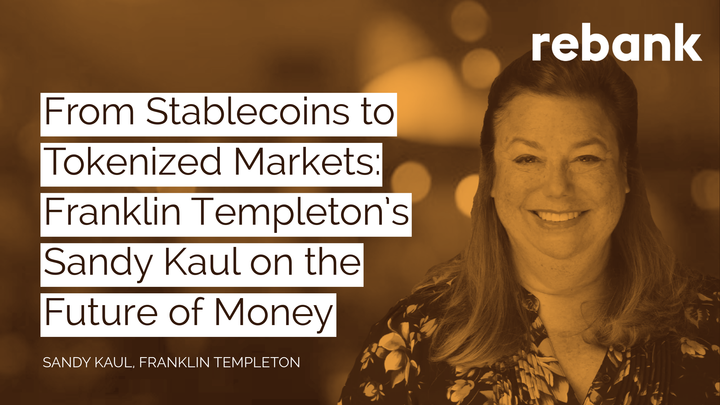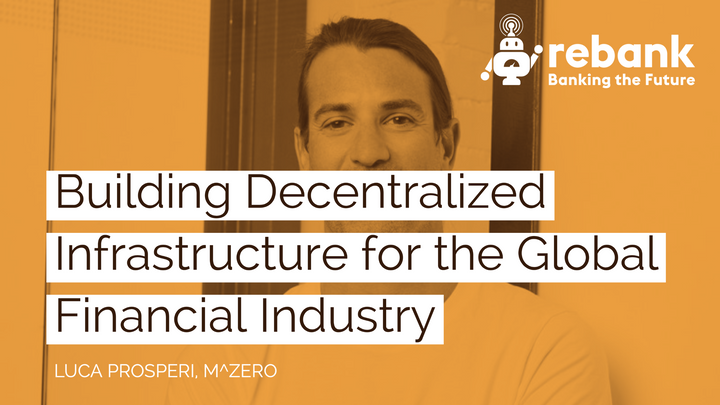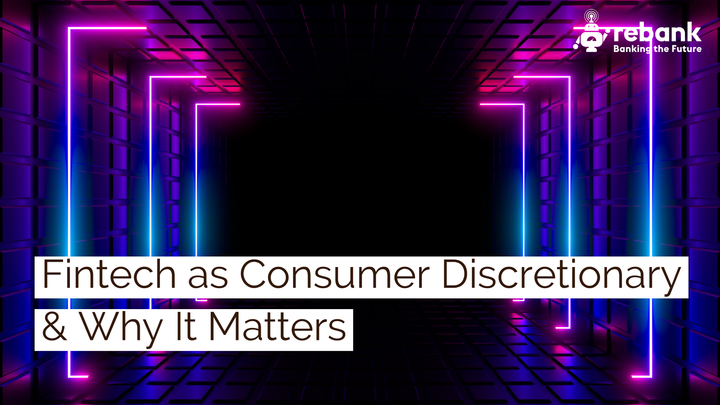The Fastest Growing Digital Bank in the World with Nubank

David Vélez is the Founder and CEO of Nubank, the leading financial technology company in Latin America.
Nubank has 5 million credit card customers, 2.5 million bank account customers and has raised $420 million from investors including Sequoia, Tencent, Tiger Global, QED, Founders Fund and more. Nubank was recently named the 3rd most innovative company in Latin America by Fast Company.
Before founding Nubank in 2013, David was a Partner at Sequoia in charge of the firm’s Latin American investments. Before Sequoia, David worked in investment banking and growth equity at Goldman, Morgan Stanley and General Atlantic.
As always, connect with us on Twitter, Facebook, LinkedIn or on our website at rebank.cc.
If you like today's episode, please subscribe on iTunes, or your podcast platform of choice, and leave us a review.
Thank you very much for joining us today. Please welcome, David Vélez.
Will:
You are the founder and CEO of Nubank — easily Brazil’s, and arguably all of Latin America’s, leading challenger bank or fintech. Call it what you will.
For those who aren’t familiar, can you give us a quick overview of Nubank and what you do?
David:
Sure. We’re a digital bank based in Brazil — currently operating exclusively in Brazil.
We started in 2014 with a physical credit card aimed at millennials, backed by a fully digital product and service experience. That was our focus for the first few years.
Today, we have around five million credit card users. Since last year, we’ve also launched a digital savings account, which now serves about two and a half million of those users.
That account offers a range of financial services — including automatic investing features, free peer-to-peer transfers, and a fully digital customer service experience from end to end.
That’s where we are today.
Will:
I’ve heard you speak before about some of the early skepticism around your proposition — the idea that no one would trust a digital-only bank.
That concern has come up in a lot of markets. Audiences in the UK and US are familiar with how that skepticism has played out. Set the scene for us in Brazil.
How entrenched are the incumbent banks? How technologically savvy is the customer base? And where does Nubank — and a digital financial proposition in general — fit into that landscape?
David:
Brazil has one of the most concentrated banking sectors in the world. Five banks effectively control 90% of everything — credit cards, lending, savings accounts, insurance.
That lack of competition is one of the key reasons Brazil also has some of the highest banking spreads globally. There’s just very little pressure to innovate or improve.
We approached this as a technology company serving financial consumers. That gave us a huge advantage — we were starting from scratch, with a blank sheet of paper. We were able to design a modern technology architecture and build a culture rooted in tech, not legacy banking.
That’s allowed us to move faster and offer much more consumer-centric products. And that’s really the key differentiator.
The large banks in Brazil, with their dominant position and historic margins, had largely forgotten about the customer. To them, customers were just people clogging up their call centers — not individuals to be served meaningfully.
Their products were designed to optimize fees — one more charge here, another one there — not to meet customer needs. That led to an enormous amount of frustration. People were — and still are — deeply dissatisfied with their banking experiences.
By starting fresh, we were able to design products focused entirely on user experience. Through digital channels, we’ve delivered those products in a way that feels intuitive, respectful, and empowering.
Of course, the traditional banks have reacted — some by launching completely new companies to compete with us, others by simply improving their apps or websites. But those efforts are more like Barnes & Noble building a website, or Blockbuster launching an online store — rather than a true Amazon or Netflix-style reinvention.
They’re working with legacy cultures and systems, and their digital responses, while notable, have seen very limited success because they lack that foundational shift in mindset.
Will:
How much of the demand you’ve seen is really about wanting something digital, efficient, and functional — versus just a demand for something cheaper and easier to use?
David:
They’re closely related. The reason we’re able to offer products with no fees is precisely because we’re fully digital.
We don’t have branches or expensive physical infrastructure, and that allows us to be more operationally efficient. We can then pass those savings on to customers through lower — or no — fees.
That’s a huge part of the appeal, especially in Brazil, where consumers are paying some of the highest interest rates and banking fees in the world. So yes, cost matters. But customer experience is just as important — maybe even more so in the long run.
That’s what really drives retention. People don’t just come for the price — they stay because the experience is better. Our attrition rate is essentially zero.
Historically, consumers in Brazil have been extremely frustrated with traditional banks. Among millennials and younger users, there’s a clear sentiment: they’d pay not to have to go into a branch.
To them, the physical banking infrastructure is a liability, not an asset. And they’re effectively paying for something they don’t want to use.
With Nubank, everything happens on the phone — and that alone is a huge improvement.
We can approve a credit card in seconds. We can get a physical card to a customer within 24 hours. They can start using a virtual card almost immediately.
Compare that to going into a branch, waiting three to five weeks, bringing paperwork, talking to a branch manager, and wasting hours just to open a basic account.
So yes, there’s very real pent-up demand for digital solutions — especially among the younger demographics we serve.
Now, of course, we don’t serve every demographic yet. If you’re 60 or 70 years old, you may still want to speak to a branch manager, have a coffee, and spend time talking through your options.
But for a large and growing segment of the population, that old model just doesn’t make sense anymore.
Will:
What approach have you taken to regulation? I imagine part of the reason you started with credit cards was that they were perhaps less regulated than traditional banking.
The account you offer today — is it technically a bank account? A bank-like account? What’s your regulatory position?
David:
Brazil is one of the most heavily regulated banking markets in the world. It’s so tightly regulated that the Brazilian constitution actually includes a clause prohibiting foreigners from investing in banks. It’s one of the few countries where the banking industry is that protected from foreign competition.
The government has tried in recent years to open things up a bit. In our case, because our investors were foreigners, we had to obtain a presidential decree just to access a banking license.
Today, we do hold a full banking license. But at the beginning, we started under what’s called a "payments license," which allowed us to issue credit cards — but not to lend. That meant we had to partner with a bank to finance the revolving credit portfolio. When customers carried balances, the lending was actually done through our banking partner.
So yes, starting with credit cards was partly a way to enter the market with a more accessible regulatory path.
That said, while the regulation itself is quite strict, the Central Bank — which is the primary regulator — has shown a strong willingness to open the market to new entrants and foster competition.
We've built an extremely positive relationship with the regulator. They’re actively thinking about how to reduce barriers and promote innovation. So, in many ways, it’s been a very supportive environment for what we’re trying to do — even if it's still a complex one.
It hasn't been easy to navigate all the rules, and we've always taken a cooperative approach: be helpful, be respectful, and fully comply with the existing laws.
Banking regulation in Brazil is taken very seriously — if you break the rules, there are immediate and severe consequences. This is not an area where you can cut corners.
From day one, our mindset has been: the regulatory framework is what it is. We're not here to fight it or change it. We're here to work smartly within it — to find ways to build a modern, digital bank that fits within those parameters.
That’s been our approach from the very beginning.
Will:
You’ve had something like 20 million credit card applications and around five million active credit card customers.
I could make some assumptions, but I’d be interested to hear directly from you — to what do you attribute that rapid growth?
David:
It really comes down to building a product that consumers absolutely love — something they’re genuinely excited about.
And we’ve offered that product in a market where, for decades, consumers have been mistreated and deeply frustrated by traditional banks.
We track customer satisfaction using Net Promoter Score (NPS), which is our primary metric for customer experience. Since we launched, our NPS has hovered between 89 and 90 — the highest we’ve seen for any consumer company in any country.
That, we believe, is the main driver behind the overwhelming demand.
And what’s even more remarkable is that five years in, we’re still growing — without spending money on marketing. Our customer acquisition cost remains effectively zero, even after surpassing five million users.
Will:
And that’s because there’s so much word-of-mouth referral?
David:
That’s right. People love the product so much that — without us paying them or offering any incentive — they become our biggest ambassadors.
They feel strongly about the experience, and they tell everyone they know. Word-of-mouth remains not only our main but effectively our only customer acquisition channel.
Will:
That Net Promoter Score of 89 to 90 — in your view, is it so high because of the incredible service you provide? Or is it also influenced by the expectations people bring from decades of underwhelming traditional banking?
In other words, is it partly about how great Nubank is — and partly about how low the bar has been?
David:
I think it’s a combination of many small things. Part of it, especially in the beginning, was definitely about where the market had been and the expectations consumers had around banking services.
When we started, no one expected this kind of product or service from a bank. So initially, there was an element of surprise — people didn’t know what to expect.
But now, we’re well-known, and expectations have shifted. Today, it's more about how we consistently maintain and deliver on that customer experience.
And within that experience, there are many components — from pricing and transparency to the quality of our customer service. But ultimately, it comes down to our culture.
We believe consumers aren’t just buying our product — they’re buying our culture. That’s what sets us apart. And it’s what makes it so hard for traditional banks to replicate what we’re doing.
It’s not about the app, or even the credit card or digital account itself. It’s about how we treat people when they get in touch with us — especially when there’s a problem.
It’s in those moments that we aim to go above and beyond. We try to wow people by giving them an experience better than anything they expected.
Will:
Can you give me an example of that?
Because it’s kind of mind-blowing to think about — credit, as an industry, tends to sit on this slippery slope.
Everyone wants access to credit, but the relationship between borrower and lender can often feel tense or adversarial. As soon as something goes wrong, borrowers often turn against lenders.
So how do you maintain such a high level of customer support and such strong Net Promoter Scores? Are there specific examples of how you go above and beyond?
David:
Yeah, I think a lot of what we’ve done is challenge the conventional wisdom around how adversarial the relationship between borrower and lender needs to be.
Ultimately, what we’re doing is helping people pay their bills, book their travel, manage their expenses — and that builds trust. One important point to mention is that we specifically target transactors — people who pay their bills on time.
Historically, most credit card issuers make the bulk of their money from customers who carry a balance and pay interest. That creates a misalignment of incentives, where the institution actually benefits when customers forget to pay — even by a day or two.
From the beginning, our goal has been to be aligned with our customers. Our ideal customer pays their bill on time. We generate revenue from interchange — the fees merchants pay when customers transact — not from interest charges.
That alignment changes everything. We’re rooting for our customers to pay on time. In fact, we thank them when they do — and many of them are surprised by that. Some even tell us, “You’re the first bank that’s ever thanked me for paying my bill.”
That kind of alignment builds trust.
Now, when someone does fall behind — maybe they lose their job or run into financial trouble — we don’t take an adversarial stance. We remain constructive and try to help. We offer advice, restructure payment plans, and look for ways to support them.
Of course, it's not ideal for us when someone doesn’t pay. But we know many of these customers genuinely want to pay — they just can't, at least for now.
We’re building a company with a long-term vision. We want to be around for decades. So we think about our relationships in that context. A customer might be struggling today, but two years from now, they could be back on their feet and ready to engage with us again.
That long-term approach allows us to preserve trust and maintain strong relationships, even in difficult moments.
Yes, credit losses are our biggest cost, and of course, we need to manage them. But we’ve found that by taking a different approach — one based on empathy and alignment — we can maintain loyalty and goodwill, which are ultimately more valuable over time.
Will:
What’s the main revenue driver then? Because I understand it’s a no-fee model, and you're targeting transactors — those who pay off their balance each month. So where does your core revenue come from?
David:
It’s interchange — the percentage we receive from merchants when someone uses their credit card to make a purchase. That’s our core revenue stream.
Will:
I'd love to switch gears a bit and hear about some of your recent fundraising.
You were in the headlines just a few weeks ago — maybe four to six weeks prior to this recording — after raising money from Tencent.
I’d be really curious to hear how that came about. Did they approach you? Did you reach out to them? And how did that deal take shape?
David:
Sure. When we started Nubank in 2014, we were launching a tech company in Brazil — a place where there weren’t many tech companies to model ourselves after.
So, I used to take my co-founders to Silicon Valley just to give them a sense of what kind of company we were trying to build. There was so much we could learn from the Valley.
But last year, we made a similar trip — this time to China. And it became clear to us that the learning opportunity there was even greater.
It almost felt like time travel. The moment you land in Beijing and see how financial services are delivered, you realize they’re ahead of anyone else globally in terms of vision and execution.
So as we looked at who we could learn from, Tencent was right at the top of that list.
I don’t think they were initially focused on Brazil, but after ongoing conversations and learning more about the opportunity here, they saw the potential.
For us, it was an incredible chance to learn from a company that’s already shaping the future of financial services in a very real way.
We had actually raised a round earlier in February, so we weren’t actively seeking more capital. But the opportunity to bring Tencent in — not just as an investor, but as a strategic partner — was too valuable to pass up.
We expect to learn a lot from them as we work to shape the financial services landscape of the future in Brazil and across Latin America.
Will:
So tell me about next steps. What’s ahead for you and Nubank? What are your future plans?
David:
We’re still very focused on building a full, end-to-end financial services platform.
Right now, we offer a credit card and a digital savings account, but we’re really just getting started.
While I can’t go into too much detail, our long-term vision has always been for consumers to be able to meet all their financial needs with Nubank.
So our roadmap is guided by that goal — identifying which products our customers are actively demanding that we don’t yet offer, and then delivering on those.
That’s where our focus will be over the next 12 months.
Will:
What’s the best way for people to connect with Nubank and learn more about your work?
David:
You can reach out to me directly, or connect with our social media team. You can also email us at todomundo@nubank.com.br, or get in touch via Facebook or Twitter.
Will:
David Vélez, thank you very much for joining us today.
David:
Thank you, Will. It’s been a pleasure.



